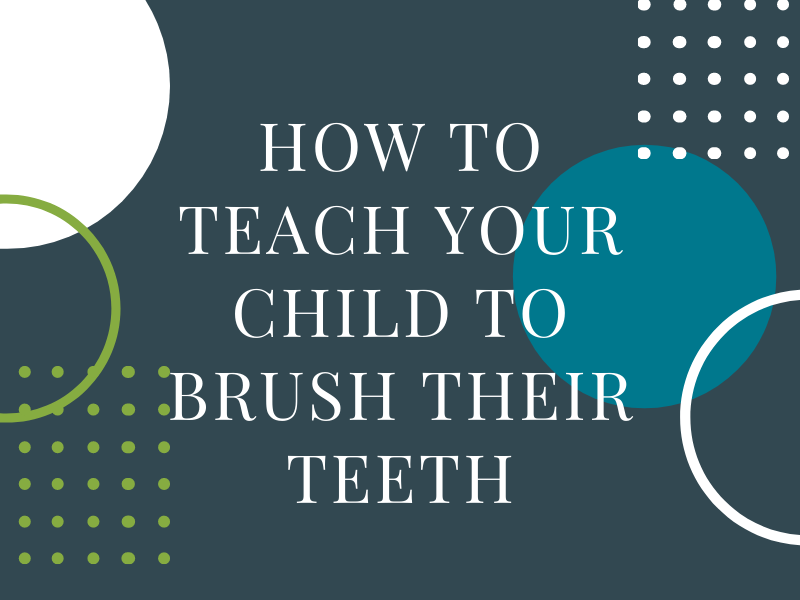HOW TO TEACH YOUR CHILD TO BRUSH THEIR TEETH
From the time your child’s first tooth appears, parents are encouraged to start brushing their teeth. From then it becomes a part of their everyday routine for the rest of their lives! We are regularly reminded about the importance of dental hygiene and brushing teeth properly whether it’s through health promotion, our own dentist, school or through advertising.
As we know, getting our children to brush their teeth is often easier said than done. For many, it’s met with resistance and for some, all-out war! A tricky dynamic, whether that is heading out the door in the morning or as part of the bedtime routine.
If it’s something you have managed to work on with your child, brushing their teeth becomes a very natural part of the daily routine for children and the entire family; however, it’s firstly about getting there!
How to teach your child to brush their teeth
When should you teach a child to brush their teeth?
‘What age should you brush your child's teeth?’ is a question I hear a lot, according to the Dental Health Foundation of Ireland as soon as a child’s first tooth appears they are at risk of tooth decay so their top tips on how to brush teeth properly are:
Correct way to brush teeth | 0 - 2 years old
Wipe baby’s gums with a damp clean cloth after feeding
When the first tooth appears, brush twice a day with a soft toothbrush and water
So not use toothpaste unless advised by your dentist
It is recommended that a child has their first dental visit by age one
Correct way to brush teeth | 2 -7 years old
Help your child with brushing in the morning and at bedtime
Use a pea-size amount of fluoride toothpaste
Do not swallow toothpaste after brushing (I never knew this so have followed this tip ever since!)
Visit your dental team at least once a year for a check-up and advice.
“a child under 2 years should have no fluoride however 2 to 7 year-olds should have 1000 to 1500 ppm fluoride and 8 years plus should have 1500ppm fluoride.”
Here is a great video to help you understand how to brush children's teeth properly
How to brush teeth properly
Hold the toothbrush at the gum line gently at a 45-degree angle
Start from the base of the tooth and work upwards
Brush the chewing surfaces using short, sweeping motions
Make sure to brush each individual tooth
Brush the roof of your mouth and tongue from back to front
Brush for 2 minutes
What do you do when your child refuses to brush their teeth?
This can be a tough one for families, particularly if they are stuck in a rut and the resistance has become a habit, there is no one answer but I have put together some ideas on how you can incorporate it into your daily tasks.
10 ways to encourage your child to brush their teeth
Here are some useful tips on how parents and caregivers can create fun ways to teach brushing teeth
Distraction
Distraction works well with smaller children, older children on the other hand need a little more encouragement, something they can invest in.
2. Independence
Part of our children growing up is allowing them to explore being more independent, so start with getting them involved, encourage your toddler to pick a fun-coloured, soft brush and fruit flavoured toothpaste, allow them to put the toothpaste on the brush.
3. It takes two!
Once a toddler takes interest in their toothbrush, allow them to hold one in their hand while you use the other to brush their teeth.
4. Mirror Mirror
Children love admiring themselves in the mirror too! Encouraging your child to watch themselves while they brush can add to the fun, let them see the toothpaste foam up in their mouth; children are very visual, and the more they can see while brushing their teeth the better.
5. Step Up
A small step in the bathroom will help them see all their pearly whites in the mirror.
6. Role Model
Brush your teeth together; let them watch you brush your teeth from an early age and alongside them. Children love to imitate grownups and older siblings, if they see you brushing your teeth the chances are they will follow your lead.
7. Time it
From egg timers to special teeth brushing sand timers, counting the time it takes to brush teeth is one way of helping children to stick to it! The recommended time is about two minutes for the older child – roughly the amount of time it takes to hum or sing the tune to Happy Birthday 3 times!
8. Make it fun
Download a dental timer app to your phone; they simply guide your child through how to brush their teeth as well as a two-minute countdown to their favourite song – this has been a winner in our house!
9. Learn
Read the book ‘Why should I brush my teeth? By Katie Daynes – this is a great lift the flap book that engages children young and old to learn more about when they should brush their teeth, How can the dentist help? Why do baby teeth fall out? And lots more!
10. Praise
Praise and co-operation – I write a lot about praising and encouragement in many parenting scenarios, what’s important is to pick your moments as opposed to praising your child for everything they do. Letting them know that you see the effort they are making can encourage them significantly to keep going. “Wow, your teeth look beautiful! You’re doing a great job at brushing”
Check out the top tips for Positive Parenting and how you can adapt your parenting style
Be Consistent
Keeping teeth brushing as part of the routine is important, as we know routine on a day-to-day basis is what keeps things working for a child whether it’s at home or school. To keep that momentum going, including teeth brushing as part of your day is no different.
Be Firm but Fair
Avoid asking your child the question ‘will you please brush your teeth?’ but replace it with ‘it’s time to brush your teeth!’. If it’s something you are working on with your child make sure to give subtle but clear reminders that it is nearly bedtime and name each step of what they need to do to get ready – including their teeth!
Remember to chat about brushing teeth during the day when there are no expectations or pressure, the more relaxed you make it the less of a chore it will be.
My son Jamie; his first time in dentist when the older two were being checked!
Next Step – The Dentist
Generally, the first public visit to the dentist through the health service is when a child is in second class of primary school, you don’t have to wait until then though. The next time that you are attending the dentist for yourself or older siblings for a routine check-up, encourage your child to sit in the dentist chair, allow the dentist to count their teeth. Allow them to have a feel for the setup, the lights, opening their mouth, the more relaxed and natural the experience is for them the easier it will be in preparation for their first official visit.
Encouragement from the dentist on the importance of brushing teeth can be a great line for your child to hear as opposed to it coming from the adults at home all the time.
What if your child is genuinely fearful or anxious about going to the dentist
I spoke to Dr. Caroline Stewart ( @carolinethedentist_), mum of three and a dentist in the Galway Dentist Clinic, and asked her what parents can do and what to avoid if their child is genuinely anxious.
Don’t
Don’t tell them not to be afraid
Don’t say that it won’t hurt, firstly because that may not be true but secondly you may put ideas in their head
Don’t run to the chair side and squeeze their hand tight as you see the needle coming
Don’t tell the dentist the reasons why you as a parent are nervous in front of your child
Do
Do build their confidence by regular visits to the dentist this way if there is a trauma or cavity, they will know the dentist, the building, the smells etc.
Do read books and watch dentist cartoons in advance and pretend play
Let the dentist do the talking, too many voices will confuse your child and might send mixed messages
Let someone else bring the child to the appointment if you are nervous
Brushing teeth is another part of our day that we often do without thinking, but it is a skill and a habit our children young and old need to establish with our help! It takes perseverance and at times firmness, boundaries but fairness thrown in too! Consider your positive and proactive options the next time there is war over the toothbrush.
If you are feeling overwhelmed or facing challenges with your children, I am here to help. I offer tailored 1 to 1 parent support sessions or corporate parenting talks. Get in touch with me today at aoife@parentsupport.ie, I offer eLearning Parenting Courses on Positive Parenting and Managing Screen Time & Device Use which will help support you in the challenges you may be facing.


